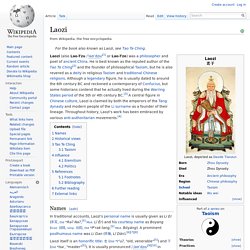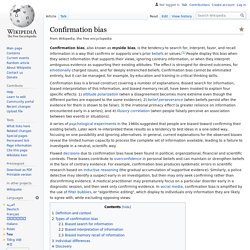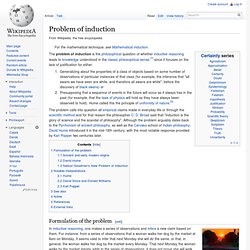

Laozi. Names[edit] In traditional accounts, Laozi's personal name is usually given as Li Er (李耳, Old *Rəʔ Nəʔ,[5] Mod.

Lǐ Ěr) and his courtesy name as Boyang (trad. 伯陽, simp. 伯阳, Old *Pˤrak-lang,[5] Mod. Bóyáng). Laozi itself is an honorific title: 老 (Old *rˤuʔ, "old, venerable"[5]) and 子 (Old *tsə′, "master"[5]). As a religious figure, he is worshipped under the name "Supreme Old Lord" (太上老君, Tàishàng Lǎojūn)[18] and as one of the "Three Pure Ones".
Historical views[edit] In the mid-twentieth century, a consensus emerged among scholars that the historicity of the person known as Laozi is doubtful and that the Tao Te Ching was "a compilation of Taoist sayings by many hands The third story in Sima Qian states that Laozi grew weary of the moral decay of life in Chengzhou and noted the kingdom's decline. Depiction of Laozi in E.T.C. A seventh-century work, the Sandong Zhunang ("Pearly Bag of the Three Caverns"), embellished the relationship between Laozi and Yinxi. Tao Te Ching[edit] Taoism[edit] Lao zi. Confirmation bias. Tendency of people to favor information that confirms their beliefs or values Confirmation bias, also known as myside bias, is the tendency to search for, interpret, favor, and recall information in a way that confirms or supports one's prior beliefs or values.[1] People display this bias when they select information that supports their views, ignoring contrary information, or when they interpret ambiguous evidence as supporting their existing attitudes.

The effect is strongest for desired outcomes, for emotionally charged issues, and for deeply entrenched beliefs. Confirmation bias cannot be eliminated entirely, but it can be managed, for example, by education and training in critical thinking skills. Confirmation bias is a broad construct covering a number of explanations. A series of psychological experiments in the 1960s suggested that people are biased toward confirming their existing beliefs. Definition and context[edit] Confirmation biases are effects in information processing. Problem of induction. The problem of induction is the philosophical question of whether inductive reasoning leads to knowledge understood in the classic philosophical sense,[1] since it focuses on the lack of justification for either: Generalizing about the properties of a class of objects based on some number of observations of particular instances of that class (for example, the inference that "all swans we have seen are white, and therefore all swans are white", before the discovery of black swans) orPresupposing that a sequence of events in the future will occur as it always has in the past (for example, that the laws of physics will hold as they have always been observed to hold).

Hume called this the principle of uniformity of nature.[2] The problem calls into question all empirical claims made in everyday life or through the scientific method and for that reason the philosopher C. D. Broad said that "induction is the glory of science and the scandal of philosophy". Formulation of the problem[edit]